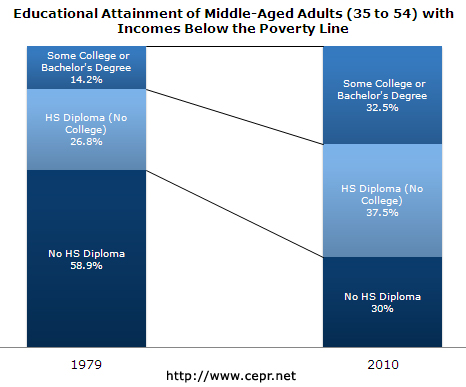Article
Fact-based, data-driven research and analysis to advance democratic debate on vital issues shaping people’s lives.
Center for Economic and Policy Research
1611 Connecticut Ave. NW
Suite 400
Washington, DC 20009
Tel: 202-293-5380
Fax: 202-588-1356
https://cepr.net
John Schmitt and Janelle Jones’ Low Wage Workers Are Older and Better Educated than Ever, a CEPR report published in April, found that … well, their title really says it all. The report got me interested in looking at whether working-age adults with incomes below the federal poverty line are also much better educated than in the past. Not surprisingly, the answer is “yes, much better educated.” As the chart below shows, among middle-aged workers living below the income poverty line, nearly one-third had at least some college or a Bachelor’s Degree in 2010, more than twice the share in 1979. And the share without a high school diploma has fallen by nearly half. A take-away point: Increasing educational attainment by itself is not at all sufficient to reduce inequality and income poverty — we need stronger labor market institutions, particularly ones that increase workers’ bargaining power to address these issues.

Technical stuff: 1979 figures are calculated from published Census tables for the 1980 March CPS. I calculated the 2010 figures using the Census CPS Table Calculator. The figures in the table use the alternative poverty measure in the calculator that allows the addition of the EITC, SNAP and other benefits not currently counted in the official poverty measure. That said, the figures don’t change significantly if these benefits aren’t counted and the official measure is used.